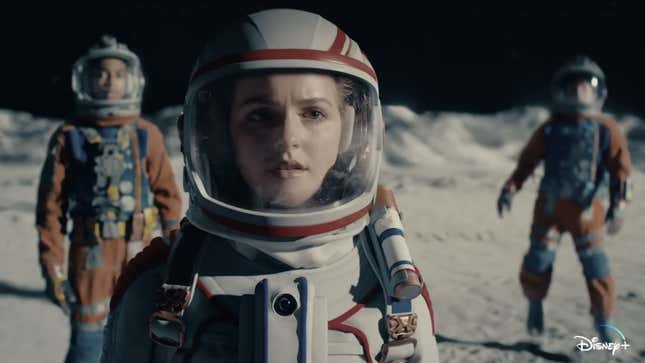
Digital media is disappearing from existence at an alarmingly quick pace. The fact that streamers are excising content isn’t new news, but somehow these entertainment conglomerates still manage to shock with these decisions. Paramount+ was the latest to do so, announcing the removal of a number of titles including Grease: Rise Of The Pink Ladies, a series that had only aired its first-season finale three weeks prior. Now, Disney+ has raised eyebrows by disappearing the film Crater just 7 weeks after it premiered on the platform.
Per The Hollywood Reporter, Disney CFO Christine McCarthy indicated that the company would be “removing certain content from streaming platforms.” That was before Crater even premiered. The sci-fi feature, which starred McKenna Grace and Scott Mescudi (a.k.a. Kid Cudi), cost $53.4 million to make, according to The Independent. But the streamers’ special little tax loophole means that getting rid of Crater and other titles will net the company a $1.5 billion tax write-down, according to a securities filing on June 2 (via THR).
On the one hand, media disappearing from memory is nothing new; in the relatively short history of film and television, there’s a lot of media that’s gone completely forgotten. (Roughly 75% of silent films have been completely lost, for instance.) But that’s obviously not a good thing, and that was an issue that streaming was presumed to fix. Indeed, streaming brought new life to certain cult classics like Arrested Development (which narrowly avoided its own removal recently). Particularly with companies like Warner Bros. and Disney in charge of their own catalogs, streaming appeared to be an easy, accessible way to preserve entertainment history while presenting new content.
Instead, new content is disappearing faster than audiences can discover and appreciate it. And since there are typically no physical copies made of these streaming originals, that media is truly lost, to us at least, forever. Some of it has been granted new life on free, ad-supported services like Roku or Tubi. But there’s a catch there too, of course: creatives receive less in residuals when their work airs on these platforms than on streaming (which was already less than the residuals through broadcast), per Vox. So in all of these scenarios, studios profit while audiences and creators alike lose out.
“It’s part of this overall mindset of the value of art and creativity that like, ‘Wow, you spent all this time on this, then you at least deserve a phone call,’” Eliza Skinner, head writer of removed Disney+ series Earth To Ned, told THR. Skinner found out the series had disappeared only after the news went public. “You at least deserve to understand a little bit what’s happening with your work. But it’s a whole climate of devaluing.”
The streaming business is precarious—perhaps more precarious than we know, given that the companies in charge tend to be opaque about their numbers. (N.B.: The opacity is one of the many issues Hollywood’s unions have raised with the studios amid a historic labor movement.) We do know that Disney+ lost more than $1 billion in Q1 this year (per IndieWire). Disney apparently expects to reach profitability by 2024, but right now it seems the company is working towards achieving that goal at the expense of the very creatives who have made Disney what it is.